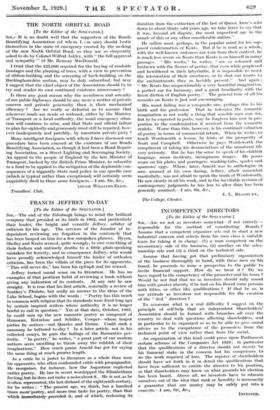FRANCIS JEFFREY TO-DAY . [To the Editor of the SPECTATOR.]. '
SIR,—The end of the Edinburgh brings to mind the brilliant company that presided at its birth in 1802, and particularly their leader, the bright and versatile Jeffrey, arbiter of criticism for his age: The services of the founder of in- dependent- reviewing are forgotten in the contumely that has been heaped on him for a few outspoken phrases. Byron, Shelley and Keats seemed, quite wrongly, to owe something of their forlorn and untimely deaths to a little plain-speaking mistaken for•ferocity, and in consequence Jeffrey, who would have proudly acknowledged himself the leader of orthodox criticism, has been the villain of .the piece for its opponents. ", This will.never do,",has been his epitaph and his reward.. " Jeffrey turned sound sense on to litenature. He has no examples of that pestilent habit of reviewing a book without giving any indication of its contents. At any rate he saw straight. It is true that his first article, nominally a review of Southey's Thalaba, but really an answer to the ideas of the Lake School, begins with the words : " Poetry has this much in common with religion that its standards were fixed long ago by certain inspired writers whose authority it is no longer lawful! to call in question." Yet at that date, October, 1802, he could sum up the new romantic poetry as composed of Rousseau, Kotzebue and Schiller, Cowper—whose teapot pieties he -notices—and Quarles and Donne. Could such a summary be bettered to-day ?, In a later article, not in his collected essays, he puts the failings of the. Romantics per- fectly. "In poetry," he writes, "a great part, of our modern authors seem unwilling to throw away the rubbish of their imaginations?? How much praise Arnold has got for saying the same thing at much greater length.
As a critic he is juster to literature as a whole than were his opponents, who-often confounded critic with propagandist. He'-recognizes, for instance, how the Augustans neglected earlier poetry. He has in secret worshipped the Elizabethans for long; but liedoes not make a noise about it.- He is not, as he is often represented; the last diehard of the eighteenth century, lot he writes : ," The -present -age, we think, has a hundred times morepcietry, and:more-true -taste for poetry, than that which immediately-preceded it, and of which, reckoning. its duration from the extinction of the last of Queen Anne's wits down to about thirty odd years ago, we take leave to say that it was, beyond all dispute,- the most unpoetical age in the annals ,of this or any other considerable nation."
He suffers most, perhaps, in the popular mind for, his, sup- posed condemnation of Keats. But if he is read as a whole,' with the well-known sentences not torn from their context, he is much less severe on Keats than Keats is on himself in many passages. "His works," he writes, "are so coloured and' bestrewn with the flowers of poetry, that even while perplexed and bewildered in their labyrinths, it is impossible to resist the intoxication of their sweetness, or to shut our hearts to the enchantments they so lavishly. present.- And again : "Mr. Keats has unquestionably a very beautiful imagination, a perfect ear for harmony, and a great familiarity with the finest diction of English poetry." The general tone of all his remarks on Keats is just and encouraging.
His worst failing was a composite one, perhaps due to his birth and his profession. That he tolerates the romantic imagination as not really a thing that sensible men care for, but to be expected in poets, may be forgiven him now in pro- portion to the condemnation it received from the romantic zealots. Worse than this, however, is his continual valuation of poetry in terms of commercial return. When he wishes to teach Wordsworth a lesson, he hints at the prosperity of Scott and Campbell. Otherwise he pays Wordsworth the compliment of taking his denunciations of the unnatural life very seriously. But he has the sense to speak of his childish language, mean incidents, incongruous images. He pours scorn on his plates and porringers, washing-tubs, spades and sparrows' eggs. Where, later, Arnold was to anthologize in awe, amazed at his own daring, Jeffrey, albeit somewhat masterfully, was not afraid to speak the truth of Wordsworth. He saw clearly in all his work, and in the inevitable revision of contemporary judgments he has less to alter than; has been generally assumed.—I am, Sir, &c.,








































 Previous page
Previous page